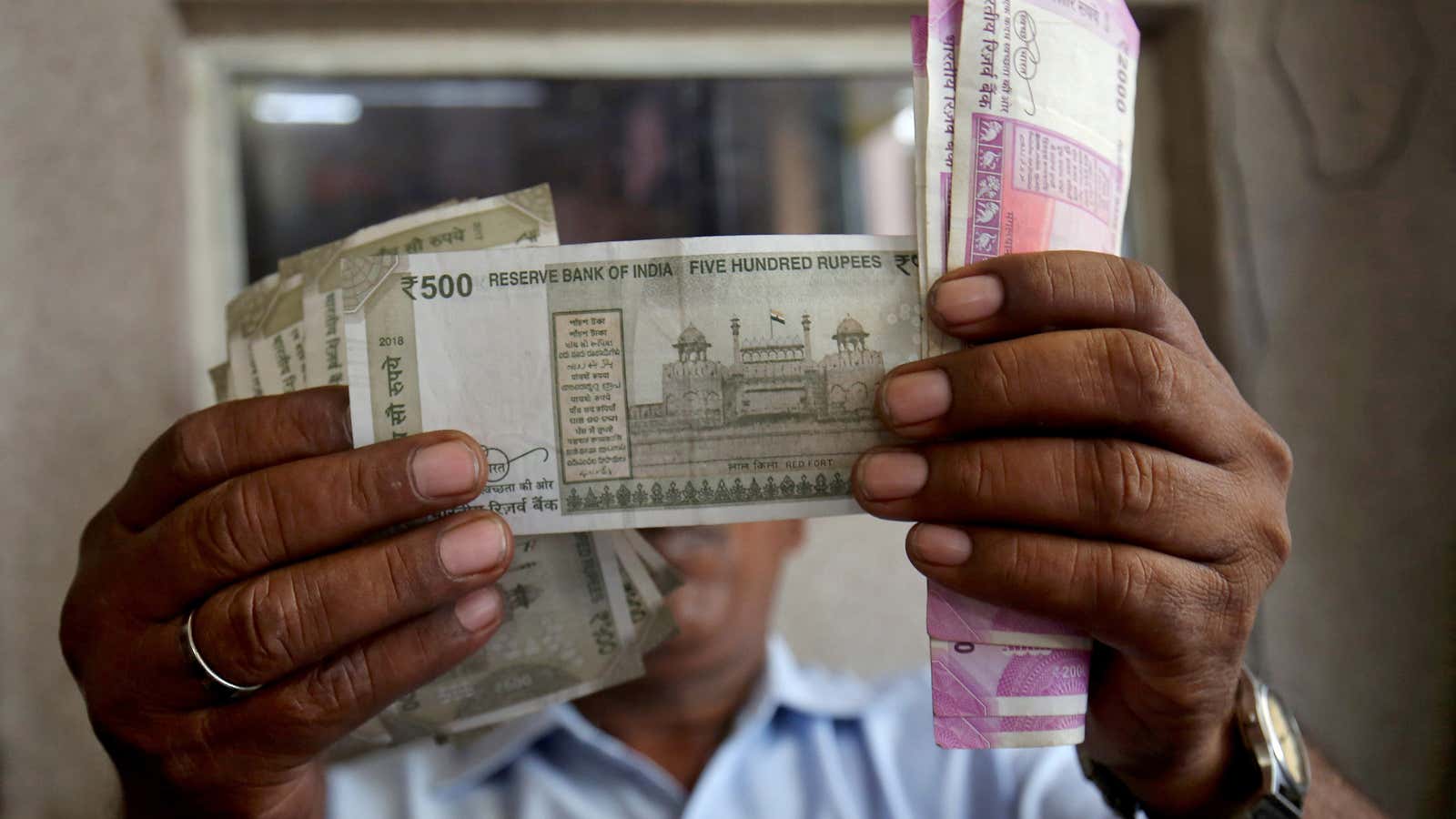There’s little festive cheer among public sector employees in India this year.
A week ahead of the country’s biggest festival, Diwali, workers at various state-owned companies are protesting unpaid salaries, pending wage revisions, and the possibility of job loss.
The financial condition of many of these units is itself worrisome.
For instance, national carrier Air India and telecom players Bharat Sanchar Nigam (BSNL) and Mahanagar Telephone Nigam (MTNL) are bleeding. On the other hand, state-owned lenders are burdened by non-performing assets (NPAs), which prompted the Narendra Modi government to announce a series of mergers, after which the banks have become overstaffed.
All this has left the 11.3 million central public sector employees tense.
No Diwali for telecom staff?
Staff of BSNL and MTNL have it the worst. Saddled with a massive debt of Rs13,000 crore ($1.81 billion), BSNL has been struggling to pay its staff since March, when it first defaulted on salary payments to its roughly 180,000 employees.
BSNL staff went on a token strike on Oct. 10 demanding the immediate release of their pending September salaries, and now plan to intensify their protests.
“I have to pay EMIs for my home, and my children’s college fees…there are so many expenses. I don’t know how I will pay,” Rajesh Sharma, a BSNL employee in Delhi, told Quartz.
It was even reported that the Modi government is contemplating a shut down of the entity. Though the government has denied the plans, that hasn’t assured anxious employees.
“There are so many rumours going around. We don’t know what will happen next, we are working but don’t know if we will get paid. The government has announced a hike in dearness allowance for its employees, but what about us? We are asking for our own dues, we don’t want a bonus but our own rightfully-earned money,” said a Noida-based BSNL employee who did not wish to be named.
Employees of MTNL, which operates in Delhi and Mumbai, haven’t received salaries for two months now. Staff observed a lunch-hour protest on Oct. 10 and Oct. 16. They are also against the retirement age being brought down to 50 years from 60 and the company’s proposed merger with BSNL.
For now, the companies have promised to clear all dues before Diwali.
Pending increments at HAL
The 79-year-old aerospace major Hindustan Aeronautics (HAL) is witnessing the biggest agitation in the company’s history. Demanding a wage revision, around 20,000 employees of the defence unit are on an indefinite strike since Oct. 14 at Bengaluru, Hyderabad, Koraput, Korwa, Kanpur, Lucknow, and Nashik.
“The response to our strike call has been overwhelming with all employees abstaining from work in nine production locations across the country,” S Chandrasekhar, the All India HAL Trade Union Coordination Committee leader, told the media on Oct. 15.
Workers are demanding 15% fitment (increase in basic salary) and 35% perks as given to executives. They say workers have been offered only 11% fitment and 22% perks, alleging discrimination. The management, however, argues that executives get a wage revision once in 10 years while workers get it once in five years.
They are yet to find common ground.
In financial year 2019, HAL recorded a turnover of Rs19,400 crore and an increase of 15% in its profit to Rs2,282 crore, a record for the aerospace major.
Bankers on strike
Banking activity across India may come to halt next week as two major trade unions have proposed an all-India strike on Oct. 22. The unions will be protesting the planned consolidation of 10 state-run lenders into four.
“We can easily understand that mergers are a prelude to privatisation and, hence, we need to vehemently oppose such moves,” the Bank Employees Federation of India said in a statement. Around 200,000 employees are expected to join the protest, fearing loss of jobs.
Mass resignations at Air India
The story in the aviation sector is no different. Various employee unions of Air India are sceptical about the plan to privatise the loss-making national carrier.
In a meeting of the unions on Oct. 14, several leaders representing pilots, engineers and officers, expressed their worries over the divestment plan. “It is evident that most of our privileges and perks are not guaranteed (after privatisation),” Captain T Praveen Keerthi, general secretary of Indian Commercial Pilots Association, said in a letter after the meeting.
Besides, there are reports that Air India does not have funds to pay salaries beyond October. Around 120 pilots tendered their resignation recently after demands pertaining to salary hike and promotion went unheeded.
Trouble in Telangana
The staff of the state-owned Telangana State Road Transport Corporation (TSRTC) in southern India are on an indefinite strike since Oct. 5, with a charter of 26 demands.
Members of the joint action committee (JAC) of the employees’ union claimed there has been no direct recruitment in the corporation for the past six years. Besides, the state government has not been paying reimbursements to the corporation for a few years. The JAC also said that a salary hike was due since 2017.
Over 49,000 employees are still waiting for their September salaries, according to a petition filed by an employee in the Telangana high court. The court has directed the corporation to pay all dues by Oct. 21.
Meanwhile, terming the protests illegal, chief minister K Chandrashekhar Rao ruled out any talks, exposing around 50,000 workers to the risk of job loss. Stepping up their protests, the TSRTC has called for a statewide shut down on Oct. 19.
